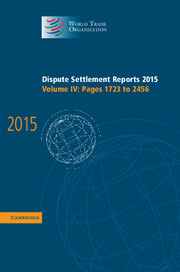Book contents
- Frontmatter
- Contents
- United States - Certain Country of Origin Labelling (COOL) Requirements Recourse to Article 21.5 of the DSU by Canada and Mexico (WT/DS384, WT/DS386): Reports of the Appellate Body
- United States - Certain Country of Origin Labelling (COOL) Requirements Recourse to Article 21.5 of the DSU by Canada and Mexico (WT/DS384, WT/DS386): Reports of the Panel
- Cumulative List of Published Disputes
United States - Certain Country of Origin Labelling (COOL) Requirements Recourse to Article 21.5 of the DSU by Canada and Mexico (WT/DS384, WT/DS386): Reports of the Appellate Body
Published online by Cambridge University Press: 28 September 2017
- Frontmatter
- Contents
- United States - Certain Country of Origin Labelling (COOL) Requirements Recourse to Article 21.5 of the DSU by Canada and Mexico (WT/DS384, WT/DS386): Reports of the Appellate Body
- United States - Certain Country of Origin Labelling (COOL) Requirements Recourse to Article 21.5 of the DSU by Canada and Mexico (WT/DS384, WT/DS386): Reports of the Panel
- Cumulative List of Published Disputes
Summary
INTRODUCTION
The United States, Canada, and Mexico each appeals certain issues of law and legal interpretations developed in the Panel Reports, United States – Certain Country of Origin Labelling (COOL) Requirements – Recourse to Article 21.5 of the DSU by Canada and Mexico (Panel Reports). The Panel was established pursuant to Article 21.5 of the Understanding on Rules and Procedures Governing the Settlement of Disputes (DSU) to consider challenges by Canada and Mexico (the complainants) of measures taken by the United States to comply with the recommendations and rulings of the Dispute Settlement Body (DSB) in the original proceedings in US – COOL (DS384 and DS386).
These disputes concern country of origin labelling (COOL) of meat products. The products at issue are imported Canadian cattle and hogs and imported Mexican cattle, which are used in the United States to produce beef and pork. In the original proceedings, the Appellate Body upheld the panel's finding under Article 2.1 of the Agreement on Technical Barriers to Trade (TBT Agreement) that the “original COOL measure” modified the conditions of competition in the US market to the detriment of imported livestock by creating an incentive in favour of processing exclusively domestic livestock and a disincentive against handling imported livestock. Furthermore, the Appellate Body upheld the original panel's ultimate conclusion that the original COOL measure was inconsistent with Article 2.1 of the TBT Agreement because it accorded less favourable treatment to imported livestock than to like domestic livestock. Moreover, the Appellate Body reversed the panel's finding that the original COOL measure was inconsistent with Article 2.2 of the TBT Agreement. The Appellate Body found that the panel properly identified the legitimate objective of the original COOL measure as being “to provide consumer information on origin”. However, it concluded that the panel had erred in its interpretation and application of Article 2.2 in finding the original COOL measure to be inconsistent with Article 2.2 of the TBT Agreement.
- Type
- Chapter
- Information
- Dispute Settlement Reports 2015 , pp. 1725 - 2018Publisher: Cambridge University PressPrint publication year: 2016

